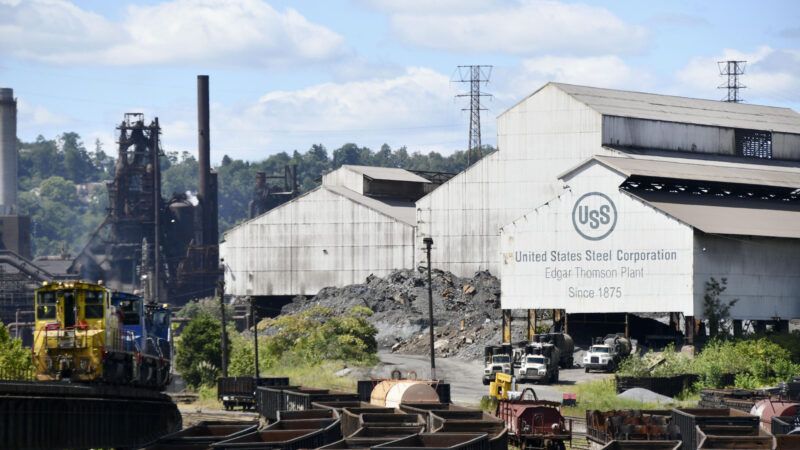Trump's Vow To Block U.S. Steel's Sale Sends Stock Tumbling
Trump doesn't care much about free market principles or the limits of government power. But he should pay attention to this signal from the stock market.

A few hours after the American stock markets closed on Monday night, President-elect Donald Trump announced that he was "totally against" the sale of U.S. Steel to a Japan-based competitor.
"As President, I will block this deal from happening," Trump promised.
When those same stock markets opened this morning, shares of U.S. Steel sank by more than 7 percent immediately (and are down nearly 8 percent as of this moment).
That's a tidy illustration of the cost of government intervention in the deal between U.S. Steel and Nippon Steel. Even though Biden's ongoing attempts to block the sale were likely priced into the stock long ago, Trump's promise on Monday night seemingly wiped out more than 7 percent of U.S. Steel's value.
What's even more remarkable is that the politicians who favor this intervention—including Biden, Trump, and others like Sen. J.D. Vance (R–Ohio), Trump's incoming vice president—continue to frame it as being in the best interest of U.S. Steel.
In fact, it is anything but that. As the stock market is signaling this morning, blocking Nippon's purchase of U.S. Steel makes the Pittsburgh-based company less valuable, in large part because it will prevent U.S. Steel from gaining the $2.7 billion that Nippon promised to invest in revamping U.S. Steel's plants.
In place of that private investment, Trump is promising "a series of Tax Incentives and Tariffs" that will "make U.S. Steel Strong and Great Again."
But more intervention by the federal government is not what U.S. Steel needs. Indeed, decades of aggressive protectionism helped to ruin U.S. Steel, as I've written before, by shielding it from foreign competition and weakening the incentives to modernize. Rather than innovating to compete with the rest of the world, U.S. Steel for years has focused its efforts on getting more aid from Washington.
In a fun twist of fate, the same federal government that for so long protected U.S. Steel from competition is now blocking the company's owners from selling the remnants. That would be funny if it weren't so utterly not the government's business.
Trump has little regard for free market principles or the limitations of government power. But one thing he does seem to care about quite a bit is the stock market. During his first term, Trump would often brag about various stock market indices hitting new highs, and he reportedly saw the rising valuations as proof that he was delivering on his political promises.
He should notice what it is telling him today about his promise to block the U.S. Steel deal.


Show Comments (66)